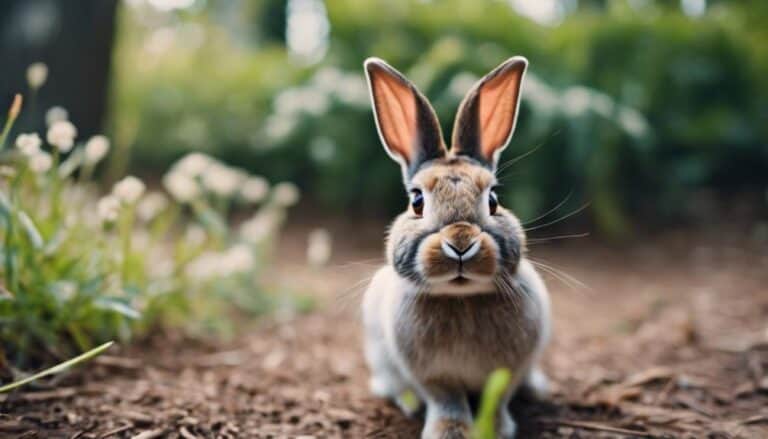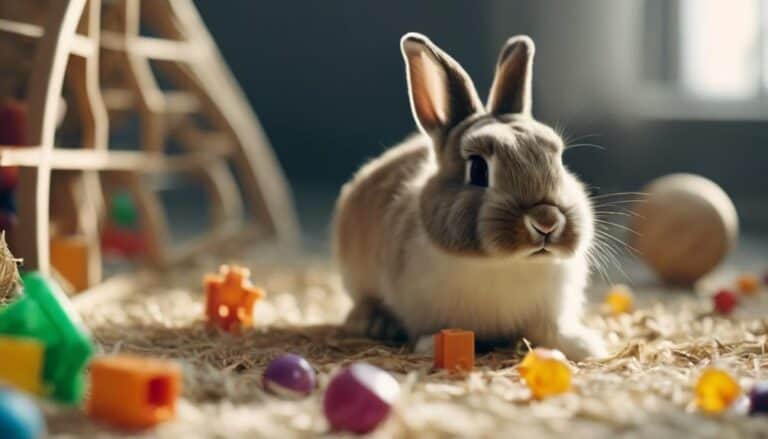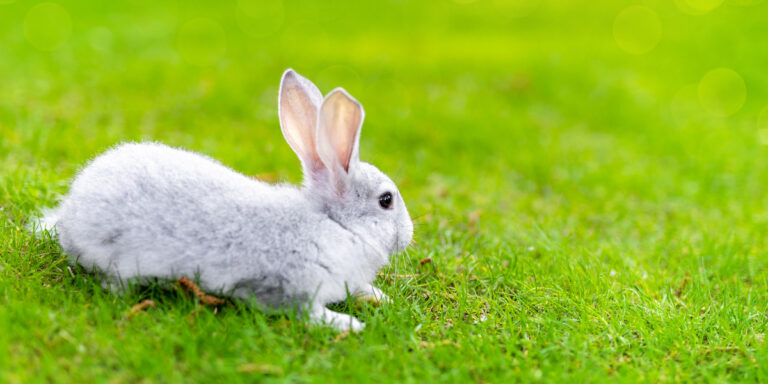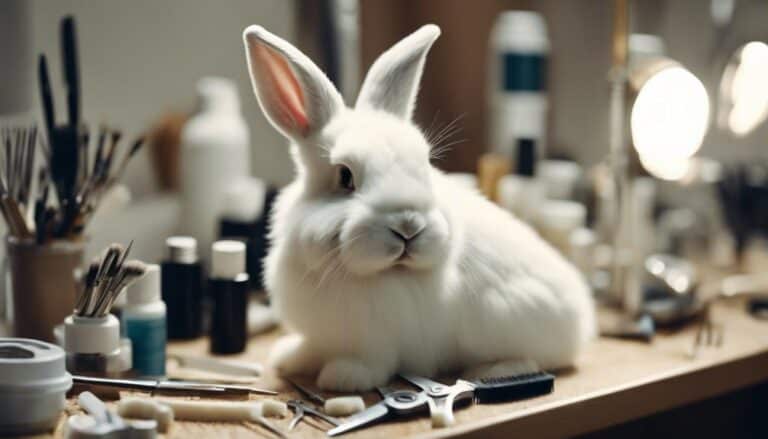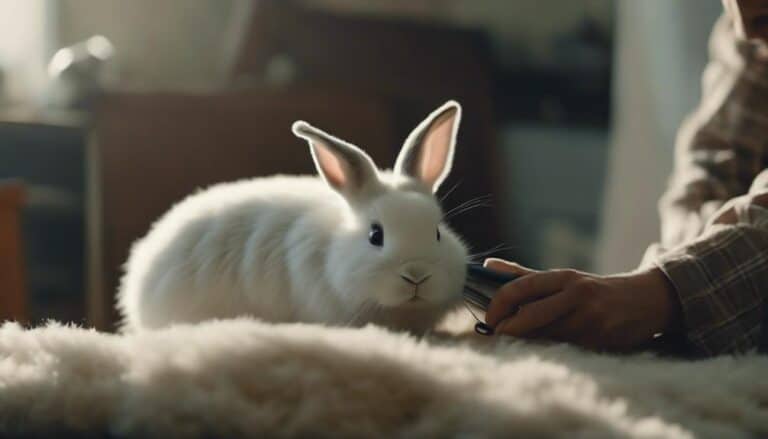Ever wondered why rabbits seem to have a knack for showing signs of dental issues? It's not just a coincidence. These furry creatures have unique dental structures that demand special attention.
From their insatiable chewing habits to the genetic cards they've been dealt, rabbits' teeth are a constant concern. But what exactly sparks these dental dilemmas?
Stay tuned to uncover the secrets behind why rabbits are prone to dental issues and how you can safeguard their dental health for a happy hopper.
Contents
- 1 Key Takeaways
- 2 Rabbits' Lifelong Teeth Growth
- 3 Genetic Vs. Acquired Dental Problems
- 4 Pain Indications in Dental Issues
- 5 Dental Disease Diagnosis in Rabbits
- 6 Front Teeth Overgrowth Symptoms
- 7 Back Teeth Overgrowth Signs
- 8 Tooth Root Abscesses in Rabbits
- 9 Preventive Measures for Dental Health
- 10 Frequently Asked Questions
- 11 Conclusion
Key Takeaways
- Lifelong teeth growth and wear compensation lead to dental issues in rabbits.
- Genetic and acquired factors influence the development of dental problems.
- Environmental aspects like diet and housing significantly impact rabbits' dental health.
- Early identification and intervention are crucial for preventing complications in rabbits with dental issues.
Rabbits' Lifelong Teeth Growth
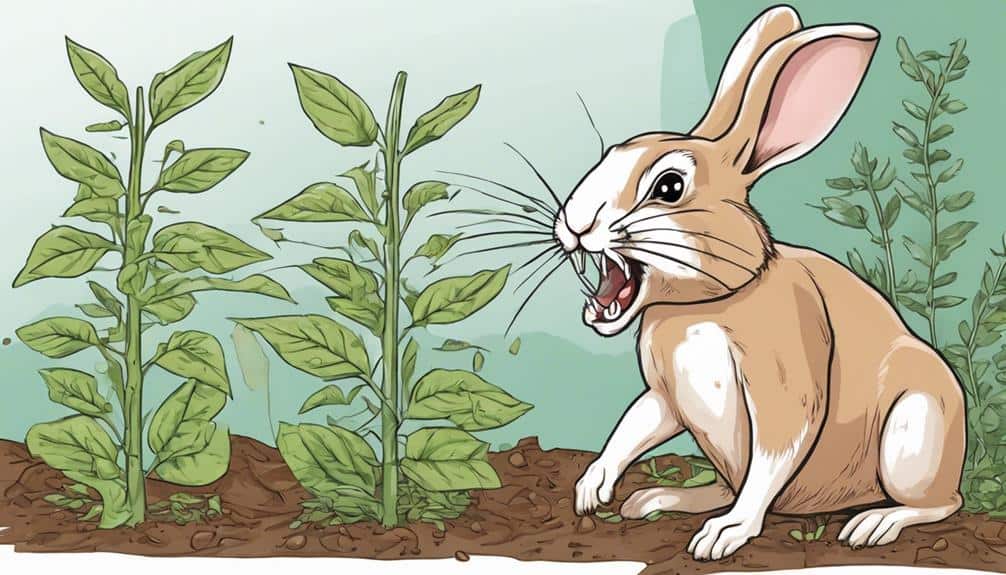
Rabbits' continual teeth growth presents a unique aspect of their dental anatomy, requiring ongoing maintenance to guarantee proper function and health. Unlike humans, whose teeth stop growing, rabbits' teeth grow continuously throughout their entire life. This adaptation is necessary to compensate for the wear their teeth experience from their fibrous diet. However, this constant growth also predisposes rabbits to dental issues.
Dental disease in rabbits can arise when their teeth become overgrown due to a lack of natural wear from chewing on fibrous foods. Ensuring that rabbits have access to important materials for chewing, such as hay and wooden toys, is essential in preventing dental problems. Regular veterinary check-ups are essential to monitor the length and alignment of a rabbit's teeth and address any issues promptly.
Understanding the lifelong growth of rabbit teeth is fundamental in maintaining their dental health and overall well-being.
Genetic Vs. Acquired Dental Problems
When considering your rabbit's dental health, it's crucial to differentiate between genetic and acquired dental problems. Genetic dental issues in rabbits can be inherited and often lead to malocclusion or misalignment of teeth.
On the other hand, acquired dental problems are typically influenced by factors like diet, environment, and the level of dental care provided.
Inherited Dental Issues
Inherited dental issues in rabbits can stem from genetic factors, impacting specific breeds more profoundly than others. Genetic dental problems in rabbits often manifest as malocclusion, misalignment of teeth, and abnormal tooth growth patterns, especially affecting the front teeth (incisors). These inherited issues may require specialized care and attention throughout the rabbit's life.
Recognizing the distinction between genetic and acquired dental problems is essential for ensuring the proper management of dental disease in rabbits. While acquired dental problems can be influenced by factors such as diet, environment, and care practices, genetic dental issues necessitate a more vigilant approach to maintain the rabbit's oral health.
Environmental Dental Factors
To properly address dental issues in rabbits, understanding the distinction between genetic and acquired problems is essential.
While genetic dental problems are inherited and can lead to malocclusion, acquired dental issues in rabbits stem from environmental factors such as diet, housing, and dental care.
Some rabbit breeds are more prone to genetic dental issues, while others develop problems due to poor oral hygiene caused by environmental factors.
Environmental elements like a lack of fiber in the diet or inadequate chewing materials can contribute to acquired dental problems.
Pain Indications in Dental Issues
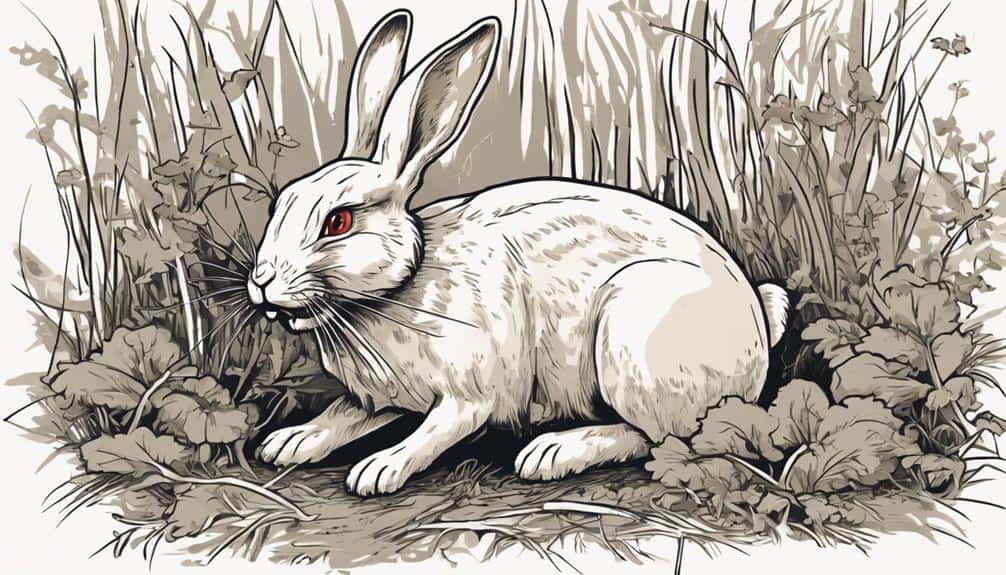
Signs of pain in rabbits with dental issues can vary from changes in behavior to physical indicators like drooling or pawing at the mouth. When observing your rabbit for signs of dental pain, consider the following:
- Changes in Behavior: Watch for subtle shifts in your rabbit's behavior such as increased aggression, lethargy, or hiding, as these could indicate underlying oral discomfort.
- Physical Indicators: Keep an eye out for drooling, reluctance to eat, or difficulty grooming, which are common signs of pain related to dental problems in rabbits.
- Teeth Grinding: If you notice your rabbit grinding its teeth, pawing at its mouth, or tilting its head, these could all be indications of oral discomfort.
- Appetite and Weight Loss: Reduced appetite, weight loss, and signs of distress while eating are also important indicators of pain in rabbits with dental issues.
Being attentive to these signs can help you identify and address potential dental problems in your rabbit promptly, preventing further complications associated with oral disease.
Dental Disease Diagnosis in Rabbits
Thorough veterinary examinations are essential for diagnosing dental disease in rabbits, with X-rays playing a critical role in confirming issues such as overgrown teeth or abscesses. When a rabbit presents symptoms of dental problems, important veterinary care is vital to prevent further complications.
During the examination, your veterinarian may recommend sedation to allow a complete evaluation of your rabbit's dental health. Specialized equipment is often used to assess the condition of your rabbit's cheek teeth, which can be challenging to visualize without proper tools.
Through these diagnostic steps, developing dental issues like overgrown teeth can be identified early, enabling effective treatment planning. Remember, proper diagnosis is key to ensuring your rabbit's oral health and overall well-being.
Front Teeth Overgrowth Symptoms
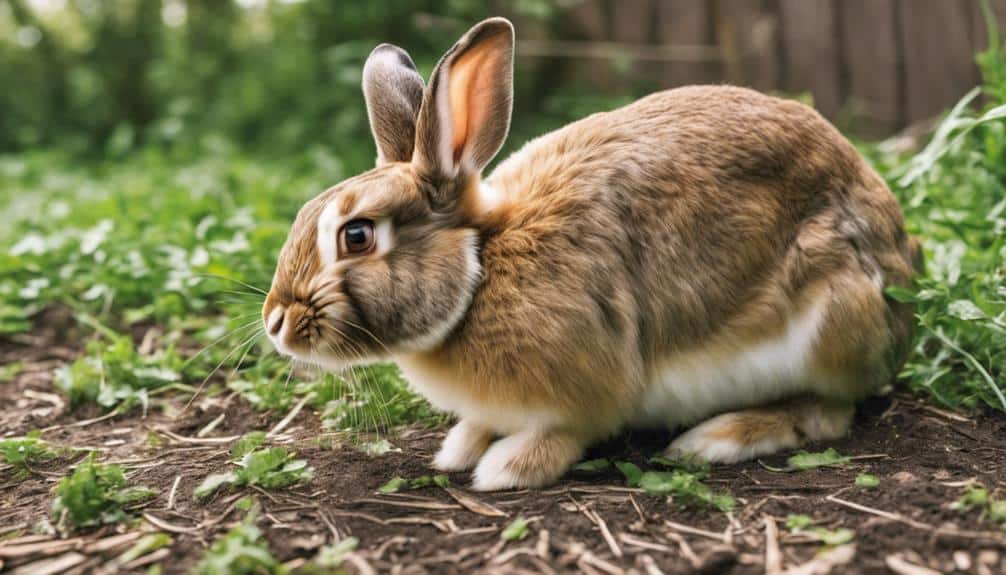
Early detection of front teeth overgrowth symptoms in rabbits is essential for maintaining their oral health and overall well-being. Here are key signs to watch for:
- Drooling: Excessive drooling in rabbits can indicate front teeth overgrowth, as their misaligned incisors may cause difficulty closing their mouths properly.
- Weight Loss: Rabbits experiencing front teeth overgrowth may struggle to eat efficiently, leading to weight loss over time due to the discomfort and pain associated with chewing.
- Pain and Discomfort: Misaligned incisors can cause pain and discomfort, affecting a rabbit's ability to groom themselves or eat properly, impacting their overall quality of life.
- Facial Swelling: Front teeth overgrowth may result in facial swelling as the misaligned incisors can create pressure points, leading to abscess formation if left unaddressed.
Back Teeth Overgrowth Signs
Detection of back teeth overgrowth in rabbits is essential for maintaining their oral health and overall well-being. Signs of back teeth overgrowth include drooling, weight loss, and reluctance to eat hard foods.
When a rabbit experiences back teeth overgrowth, it can lead to pain and difficulty in chewing, causing them to avoid certain foods. The discomfort can result in weight loss as the rabbit struggles to consume an adequate amount of food. Additionally, drooling may occur due to the pain and challenges in properly closing the mouth.
Behavioral changes such as reduced grooming or increased teeth grinding may also be observed in rabbits with back teeth overgrowth. Regular veterinary check-ups are vital to detect and address back teeth overgrowth promptly before it progresses to more severe issues like abscess formation, which can have a significant impact on the rabbit's overall health and well-being.
Tooth Root Abscesses in Rabbits
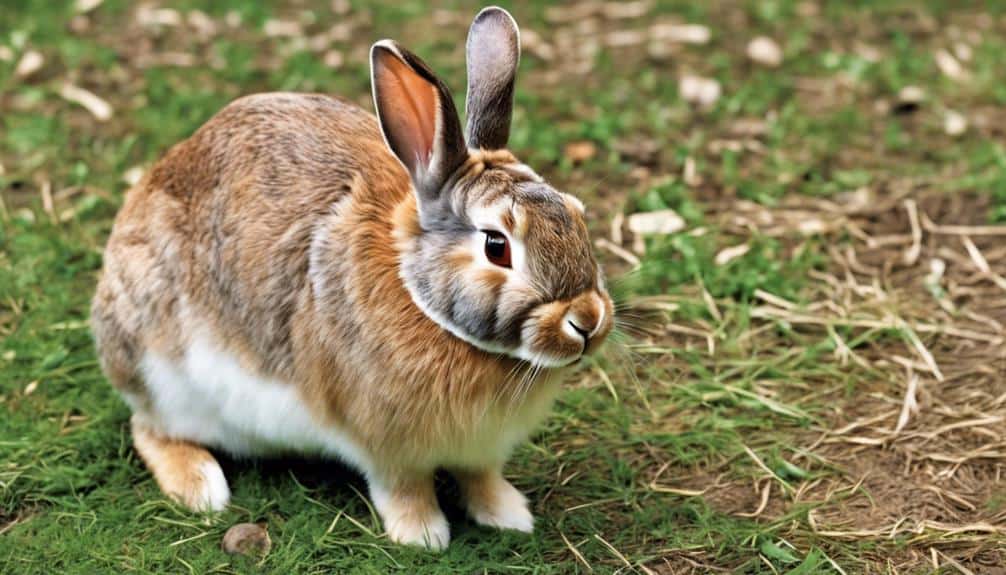
Tooth root abscesses in rabbits, commonly triggered by bacterial infections in the teeth roots, can lead to facial swelling and discomfort for the animals. When a rabbit suffers from a tooth root abscess, several key points come into play:
- The infection in the tooth roots can cause pain and swelling around the rabbit's face, particularly under the jaw.
- These abscesses may result in symptoms like drooling, difficulty eating, and visible facial swellings.
- If left untreated, severe tooth root abscesses can extend to affect the tear ducts, potentially leading to eye issues for the rabbit.
- Proper diagnosis and treatment of tooth root abscesses are essential not only to alleviate the rabbit's pain but also to prevent further complications that could arise, such as secondary infections or chronic dental disease.
Understanding the significance of monitoring your rabbit's dental health, especially concerning the incisors and tooth roots, is vital in maintaining their overall well-being and quality of life.
Preventive Measures for Dental Health
To maintain your rabbit's dental health, make sure their diet consists of unlimited grass hay for natural tooth wear and offer chew toys to aid in wearing down their teeth.
Additionally, limit sugary treats and provide a balanced, high-fiber diet to support best dental health.
Regular veterinary check-ups are important for early detection of dental issues and to prevent them from escalating.
Diet's Role in Prevention
Promoting best dental health in rabbits involves strategically incorporating high-fiber elements into their diet to support natural tooth wear and prevent potential issues. To assure your rabbit's teeth stay healthy, consider the following tips:
- Offer a diet that includes grass hay and limited pellets: These high-fiber foods encourage proper tooth wear.
- Provide appropriate chew toys and safe items to gnaw on: Supporting normal wear prevents overgrowth.
- Avoid sugary treats and low-fiber foods: Maintaining proper dental alignment and function reduces the risk of dental disease.
- Include fresh, leafy greens and vegetables: These supplement the diet, promoting chewing and grinding action for better dental health.
Regular Dental Checkups
Regular dental check-ups play an important role in early detection and prevention of dental issues in rabbits. These check-ups are essential for monitoring the growth and alignment of both front and back teeth. Dental problems like overgrown teeth or spurs can lead to severe complications if left untreated.
Through routine dental examinations, veterinarians can identify these issues promptly, preventing pain and eating difficulties for your rabbit. Early intervention during dental check-ups is key to maintaining your rabbit's oral health and overall well-being. Experienced veterinarians can offer valuable guidance on preventive measures and suitable treatment options tailored to your rabbit's specific needs.
Prioritizing regular dental check-ups is essential for ensuring your rabbit's dental health and happiness.
Frequently Asked Questions
How Do I Know if My Rabbit Has Dental Problems?
To know if your rabbit has dental problems, observe reduced appetite, weight loss, or changes in eating habits. Look for signs like drooling, difficulty eating, or pawing at the mouth. Regular dental examination, proper diet, and veterinary care are essential for prevention and treatment.
Can Dental Disease Be Cured in Rabbits?
You can't fully cure dental disease in rabbits; it requires consistent care. Prevention methods, treatment options, dental care, and diet management are essential. Regular vet check-ups and a proper diet can help manage and alleviate discomfort for your furry friend.
What Is End Stage Dental Disease in Rabbits?
End stage dental disease in rabbits presents severe pain, weight loss, and eating difficulties. Treatment options include dental procedures and pain management. Prevention methods involve regular vet visits. Symptoms to watch for are drooling and malnutrition. It impacts overall health considerably.
What Are Mouth Diseases in Rabbits?
To prevent mouth diseases in rabbits, make sure regular dental check-ups. Common symptoms include drooling, weight loss, and changes in eating habits. Treatment options involve addressing dental malocclusion, overgrown teeth, spurs, and abscesses. Risk factors include poor diet and genetics.
Conclusion
To sum up, the dental issues faced by rabbits are nothing short of a dental catastrophe waiting to happen. With their constant teeth growth, genetic predisposition, and dietary factors at play, these furry friends are walking on a tightrope of oral health.
It's imperative for rabbit owners to be vigilant, proactive, and thorough in monitoring their pets' dental health to prevent a potential dental disaster. Prevention is key, and early intervention can save your rabbit from a world of dental woes.

